We all have an image of what depression looks like. It’s sad, low energy, and withdrawn from connection with friends and family. But while intense and long-term sadness is almost always a facet of depression, it is not the only element by far.
In fact, it’s possible to be clinically depressed without realizing it!
Because depression diminishes quality of life and can even lead to suicide, it’s critical to seek treatment if you suspect that you or a loved one is suffering from it.
Please review our list of potential symptoms – some are obvious, but others are quite sneaky.
Click next under the picture to continue reading.

Advertisements

Advertisements
1. Lingering sadness

Sadness is the most common symptom of depression but not the only one.
Depression-related sadness is persistent and may feel like a heavy weight that holds you back from moving forward in life.
2. Exhaustion

Akin to sadness, depression-related exhaustion will make you feel like you’re dragging through your day.
You will sleep a lot more and for longer periods of time than usual.
3. Irritability/short temper

Sometimes depression manifests as a short fuse that has you snapping at people for no good reason.
This is often because you’re already feeling overwhelmed and new requests or demands on your time are frustrating.
4. Back pain

The thought here is that feeling stressed and sad often leads to slouching or muscle tension that eventually manifests in back pain.
Attention to posture and regular massage can help minimize this symptom.
5. Weight gain

Weight gain can be a symptom of depression if you’ve recently started to eat emotionally or thoughtlessly.
This is linked to the body’s desire to boost serotonin by doing something that should be pleasurable.
6. Emotional numbness

Do you feel as though you are observing your life from a distance?
You know how you should feel in various situations, even how you used to feel, but there is just numbness where emotion should be.
7. Increased alcohol consumption

It’s common for folks with undiagnosed depression to drink more alcohol than usual in an attempt to self-medicate and relieve painful feelings.
Unfortunately, associated guilt and shame can compound the problem.
8. Wasting time/listlessness

You may have depression if you can’t seem to get moving on any required task.
Instead you just pass the time with meaningless activities like pacing, scrolling social media, or playing computer games.
9. Excessive daydreaming

Is your head in the clouds, focused entirely on fantasy situations that could take you away from the pain of the present?
That could be an indicator of depression.
10. Indecisiveness

We use social cues, expected consequences, and personal feelings to make daily decisions.
But when depression has muted the ability to care about the outcome of any given choice, it gets very difficult to make one.
11. Inattention to personal grooming

If you find that you just don’t care at all how you present to others, it can be a sign.
Depression could be eating away at your desire for human connection.
12. Inability to concentrate

Scientists from Harvard University say that the human brain is happiest when it is engaged in the present moment.
The inability to stay focused on the here and now can trigger anxiety and depression.
13. Loss of interest in sex

This symptom may indicate depression if your sex drive has changed drastically for no known physical reason.
It could also be a likely component of a larger aversion to human connection.
14. Feeling worthless

You are doing just fine at work, your kids are happy and healthy, but you still feel that you’re not enough.
If you can’t shake the groundless feeling of worthlessness, depression could be the cause.
15. Frequent thoughts of death

Depression is a major risk factor for suicide, so please speak up if you’re thinking about harming yourself, or have repeated thoughts that death is the answer.
Healing is possible with the right help.
16. Anxiety

Sometimes anxiety is a reaction to feeling lost, confused, or just different than before.
This symptom may be easier to recognize than emotional numbness, which is the lack of feeling rather than an intense feeling.
17. Pessimism

Have you felt lately that every venture is doomed to fail and that there’s nothing to do about it?
Some people are naturally pessimistic, but if this is unusual for you it could be a symptom of depression.
18. Risky decision-making

Diminished emotional responses can be upsetting and lead folks to seek out risky situations for a boost of adrenaline.
This could manifest in an affair, interest in adventure sports, or disregard of dangerous surroundings.
19. Intense feelings of guilt

We all feel guilty sometimes based on behavior.
But the type of guilt that may indicate depression is persistent and not linked in reality to anything you said or did.
20. Perfectionism/unrealistic expectations

Everyone wants to be able do it all, but most people recognize that it’s not realistic.
If you find it impossible to cut yourself some slack or get past perceived failings, depression could be the cause.
21. Trouble falling or staying asleep

A depressed mind obsesses about negative things, which makes it hard to drift off or to stay asleep.
This exacerbates general exhaustion and the desire to sleep more due to poor quality rest.
22. Migraines

Some studies indicate that almost 40% of migraine sufferers also experience depression.
Which condition may cause the other is not known, but if you get frequent migraines, additional attention to the possibility of depression is helpful.
23. Digestive issues

Surprisingly, the nerve cells in our guts produce up to 90% of the body’s serotonin.
That’s why a poor diet can affect mood and digestion. Constipation, diarrhea, and bloating are potential side effects of a serotonin shortage.
24. Repetitive thoughts

Same disturbing thought cycles through your mind without end, disrupting productivity and causing you to “check out” of the moment?
Consider whether depression might be the underlying cause.
25. Excessive crying

Emotional numbness is not always present in depression; sometimes sufferers find that their emotions are on a hair-trigger.
Excessive crying, especially if it becomes difficult to pinpoint what precipitated the tears, may indicate depression.
26. Loss of appetite

Some people with depression eat more than usual in an effort to feel better.
Others experience a diminished appetite that goes along with a lack of self worth. They may believe they don’t deserve fundamental care.
27. Mood swings

Depression causes a host of emotions beyond sadness, such as anger, frustration, guilt, and even moments of joy.
If you are all over the map with your emotions, it’s another clue that depression is the underlying condition.
Conclusion.
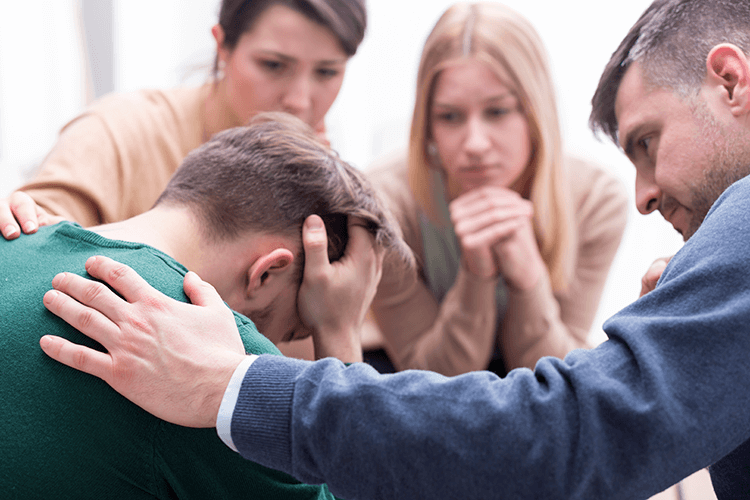
If you suspect that you are suffering from depression, please ask for help as soon as possible, or at least be open to a loved one who volunteers to seek help on your behalf.
Many treatments are available to help depression sufferers attack the root of the problem, feel joy again, and take comfort in the love and concern of their community. You are worth the effort!
Click Next for more information that will help you stay healthy and positive
Cancer is one of the most deadliest and scariest diseases. Diagnosis is always a huge shock.
Yet, many cancers are highly curable when caught early. That’s why it’s very important to be on constant alert for cancer symptoms.
Here are the 11 cancer symptoms you should NOT ignore.
Pay special attention to the last one, since it can easily be misinterpreted.
Click next under the picture to continue reading.


1. Persistent fatigue

Persistent fatigue can be an important symptom of leukemia and colon or stomach cancers. It may manifest itself differently from everyday fatigue.
Cancer-related fatigue often doesn’t go away after a good sleep and lasts longer. Sometimes it is caused by blood loss that’s not obvious.
2. Unexplained weight loss
Advertisements

Most people with cancer are likely to lose weight at some point. If you don’t recall any specific reason, like exercising more, or changing diet, a rapid unexplained weight loss can be a dangerous sign.
An unexpected weight loss of 10 pounds or more may be one of the first signs of cancer and can be used to catch it early.
3. Unexplained thickening or lump

Examine your body regularly. A lump, or thickening may be an early or late sign of cancer and should immediately be reported to a doctor.
Pay extra attention to new lumps or thickening or those that are changing in size. Don’t stress over it too early though. Many of those changes in your body can be completely benign.
4. Constant pain

Although pain can be a symptom of a huge variety of diseases, it can also indicate cancer. If the pain is unexplained and doesn’t go away or get better with treatment, it’s a warning sign.
Depending on where the pain is localized, it can be a symptom of a brain tumor, cancer of colon, rectum or ovary.
5. Frequent fever

Almost all people with cancer are likely to have fever at some stage, especially if cancer affects the immune system.
Although fever is more common at late stages, it can also be an early sign of blood cancers, such as leukemia or lymphoma. In any case, if you often experience fever, especially you cannot understand a reason, best to seek medical attention.
6. Skin changes

Skin cancer is considered to be the most common type of cancer and sometimes it can be difficult to recognize it in the early stages.
Anytime you have a freckle, wart, or mole that changes color, size, or shape, or if it loses its sharp border, then you should have it checked out for melanoma or some of the other types of skin cancer. However, besides skin cancers, other cancers can also cause skin changes. Pay attention to signs and symptoms which include: darker, yellowish or reddened skin, itching, bleeding, etc.
7. Change in bowel or bladder habits

If you experience long-term constipation, diarrhea or a change in the size of the stool, it may be a good idea to visit a doctor.
These are signs of colon cancer. Symptoms of bladder or prostate cancer include pain when passing urine, blood in the urine or a change in bladder function. Report these types of unusual signs to a doctor, however, keep in mind these could also be a signal of a urinary tract infection.
8. Nagging cough or hoarseness

A cough every once in a while isn’t usually anything to worry about. However, a persistent cough that doesn’t go away is a cause for concern.
Most coughs aren’t cancer, but it should still be evaluated by your doctor. Pay extra attention if cough causes pain in your chest, shoulder or back area.
9. Unusual Bleeding

Unusual bleeding is always something worth investigating, even if it’s not a sign of a cancer. However it can also happen in early or advanced cancer.
Coughing up blood, blood in the stool or urine, abnormal vaginal bleeding are all dangerous signs.
10. Indigestion or trouble swallowing
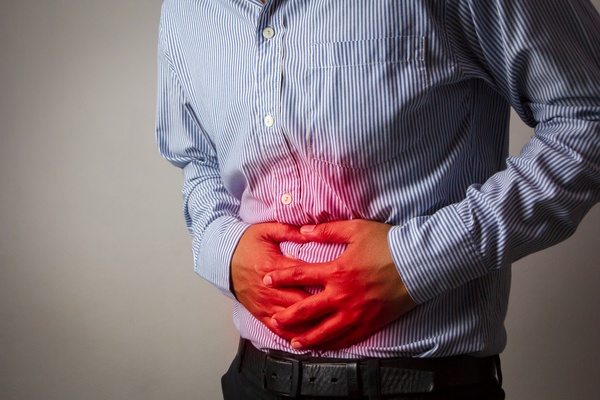
Indigestion issues that don’t go away could be symptoms of cancer. Potential causes are cancers of esophagus, stomach, or throat.
However, in vast majority of cases, indigestion or swallowing problems indicate something other than cancer.
11. Other Symptoms

These signs and symptoms we just reviewed are the more common ones, appearing in cancer patients. However, there’s a huge variety of other possible symptoms.
Swollen feet, for example, are not necessarily a symptom of cancer, but rather side effects from cancer treatments, but if you are experiencing unexplained swollen feet, best to consult with your doctor.
Overall, if you notice any major changes in how your body looks and feels, especially if the condition doesn’t go away for a long time – talk to your doctor.
Again, spotting cancer early can significantly increase your chances.
Click Next to learn what cancer causing food you might be eating every day.
You are likely aware that eating junk food is a major risk factor for cancer. But did you know that some so-called health foods are actually carcinogens in disguise?
Or that certain ingredients found in virtually all packaged foods present a serious health risk?
By being an informed consumer, we can help influence for good the types of products that end up on our grocery shelves, and enjoy better health to boot.
Read on to discover 17 very common foods known to increase cancer risk, along with some healthier alternatives.
Click next under the picture to continue reading.
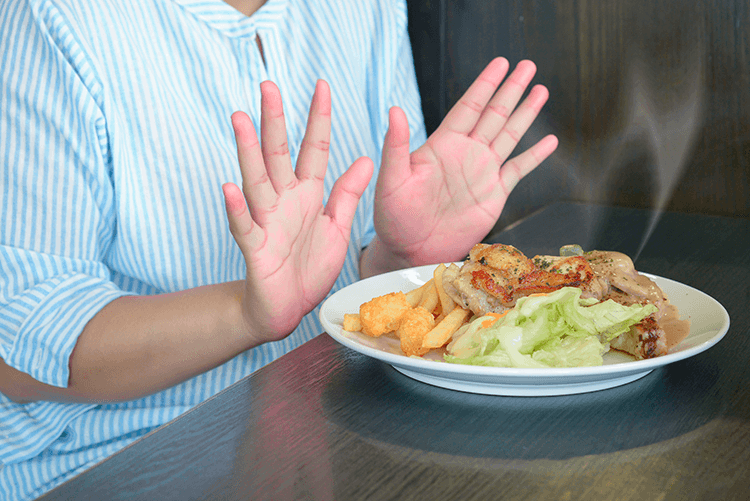

1. Soda

Not only is soda jampacked with sugar – cancer’s fuel of choice – but it often also contains caramel color. This artificial coloring has the carcinogenic chemical 4-MEI as a byproduct. Laboratory tests show that 4-MEI shows up in sodas with caramel color.
Alternatives – Water is always best, but if you really crave the sweet, bubbly hit of soda, choose a natural brand without caramel color.
2. Grilled red meat

While a nice char on that steak may taste good, the high temperatures used for its cooking produce cancer-causing hydrocarbons. And excessive consumption of red meat in general is thought to up your cancer risk.
Alternatives – Eat red meat sparingly, cook it carefully, and choose organic, grass fed beef if possible.
3. Microwave popcorn

There’s a triple whammy here – the butter flavoring used in many microwave popcorn brands releases diacetyl, a known toxin, when cooked. Next, the perfluorooctanoic acid that lines the bags themselves is carcinogenic. And finally, popcorn producers are not required to report whether or not their kernels are GMO.
Alternatives – Buy organic kernels and pop them in an air popper or on your stove.
4. Canned food, especially tomatoes

Canned foods are dangerous because the cans are lined with the chemical BPA, a known hormone disrupter. Canned tomatoes are especially problematic because their acidity causes the BPA to leach into the food. Tomatoes in general are very healthy; it’s the packaging that’s the problem here.
Alternatives – Eat fresh or frozen produce.
5. Hydrogenated oils

Vegetable oils are not extracted from their source naturally, but instead must undergo a chemical process. Later, even more chemicals are added to achieve the desired look and consistency of the product, resulting in an extremely high level of unhealthy omega-6 fats.
Alternatives – Choose olive, soy, or canola oil instead; these oils are naturally extracted.
6. Farmed salmon

Though wild-caught salmon is one of the healthiest proteins you can eat, the farmed version is fed an unnatural diet full of chemicals, pesticides, and antibiotics. They are also fattier than wild-caught, and therefore store more of the bad stuff in their bodies.
Alternatives – Eat wild-caught salmon or augment your diet with a purified fish oil supplement.
7. Artificial sweeteners

Most artificial sweeteners are produced by a chemical process, and there isn’t enough data to really deem them safe. Some studies suggest that artificial sweeteners cause the toxin DKP to build up in the body and potentially cause brain tumors.
Alternatives – If you must use sweetener, choose plant-based Stevia. Certain recipes can also substitute applesauce for sweetener.
8. Refined white flour

The refining process strips away all nutritional value from the original wheat. Even worse, the flour is then bleached with chlorine gas to achieve that appealing white color. White flour is a carbohydrate that breaks down into simple sugar, cancer’s preferred fuel.
Alternatives – Choose unbleached, whole wheat flour for your cooking, and read labels carefully to determine how much of the white stuff is in packaged products.
9. Non-organic fruits & vegetables

The fruits and veggies themselves are extremely healthy, but the pesticides sprayed on them are anything but. Altrazine, for example, is a weed-killer that has been banned in Europe for causing severe problems in humans, but is still commonly used in the U.S.
Alternatives – Buy organic as much as you can, and carefully wash all produce before eating.
10. Processed meat

This includes things like bacon, hot dogs, sausage, and deli meats. The processing often adds huge amounts of salt as well as dangerous chemicals, especially nitrate and nitrite. The additives are intended to make the food look nicer and last longer, but carry a steep risk to your health.
Alternatives – Eat mostly fresh, organic meats and look for other products with minimal processing and no preservatives.
11. Potato chips
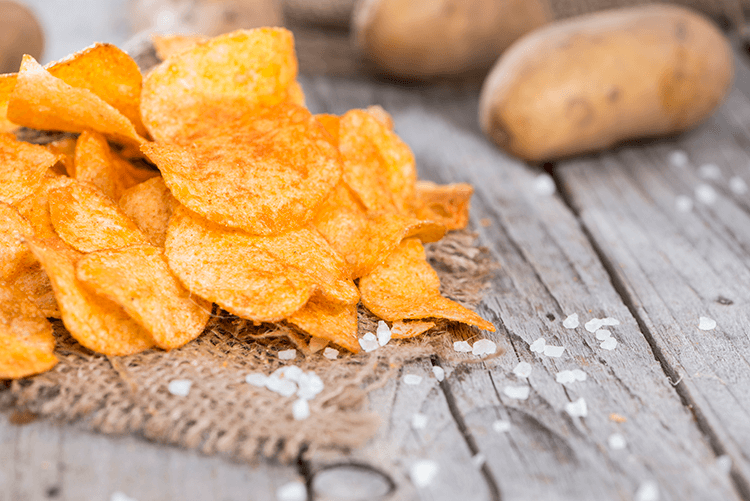
Potato chips are offenders for several reasons. One, they are fried in trans fats, and two, they are loaded with salt. Many varieties also have preservatives and artificial coloring.
Alternatives – Pretzels, air popped popcorn, dried apple or banana chips.
12. GMO foods

There is fierce debate about the safety of GMO foods. Huge food producers like GMO products because they have been modified to better resist pests, be easier to transport, and last longer. However, very little safety testing was done before the foods hit shelves, and we have no idea of their long-term health effects.
Alternatives – Organic produce and meats; packaged foods with a Non-GMO label.
13. Alcohol

Studies by the National Cancer Institute have shown a link between alcohol consumption and cancers of the head and neck, esophagus, liver, breast, and colon.
Alternatives – If you are not ready to quit entirely, keep your alcohol consumption in the low risk category – no more than 3 drinks in a sitting for women and 4 drinks in a sitting for men, with no more than 7 drinks total per week for women and 14 total per week for men.
14. Refined sugars

The worst offender in this category is high fructose corn syrup, and it’s in a ton of processed foods and drinks. For example, you’ll find 15 teaspoons of the stuff in one 20 oz soda! As we know, cancer loves to feed on sugar.
Alternatives – Always scan the ingredients list when buying packaged food; the sugar content will surprise you. Satisfy your sweet tooth with whole fruit rather than candy.
15. Margarine

Margarine was supposed to be a healthier alternative to butter, but as it turns out, margarine is made from hydrogenated vegetable oils and is full of trans fats. Recent studies have suggested that trans fats are way more dangerous than the saturated fats found in butter.
Alternatives – Still go easy on the butter, but choose it over margarine. Olive oil flavored with herbs is also a nice topping for bread or veggies.
16. Diet foods

This one’s a real kick in the teeth – you think you’re making a smart choice by purchasing “diet” foods, but in reality these products are often jammed with extra sugar or artificial sweeteners to replace any fat that’s removed. They may also contain various chemicals designed to get you hooked and coming back for more.
Alternatives – Eat fresh, whole foods rather than packaged diet meals.
17. French fries

French fries taste so good, but being fried in trans fats and then heavily salted makes them a real cancer risk. Foods heated to such a high temperature also produce acrylamide, a known carcinogen found in cigarette smoke.
Alternatives – Check out some recipes for baked fries; using flavorful spices and olive oil produces a very tasty and much healthier side dish.
Conclusion
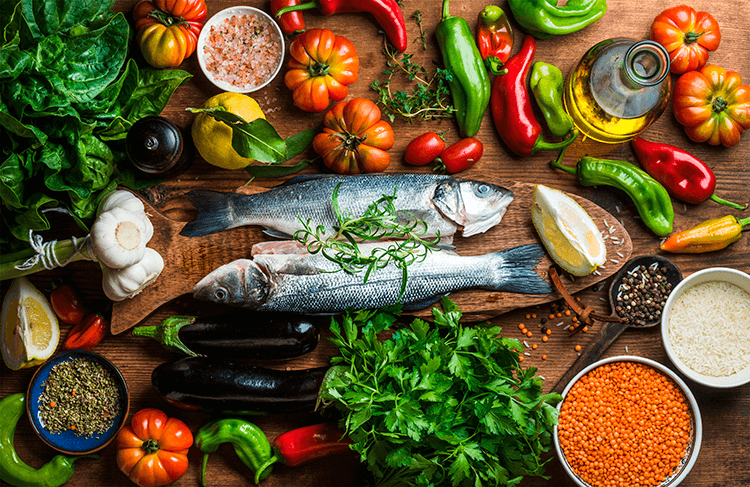
It’s easy to be overwhelmed by information on the good and the bad in food choices.
But luckily it can all be boiled down into some simple guidelines. Simply shifting your mealtime balance towards whole foods (away from packaged products) and skipping the sodas will make a huge difference in cancer risk.
Life is very busy, but kitchen time can be quality time for the entire family.
Click Next to learn about 11 important cancer symptoms you’re probably ignoring
Cancer is one of the most deadliest and scariest diseases. Diagnosis is always a huge shock.
Yet, many cancers are highly curable when caught early. That’s why it’s very important to be on constant alert for cancer symptoms.
Here are the 11 cancer symptoms you should NOT ignore.
Pay special attention to the last one, since it can easily be misinterpreted.
Click next under the picture to continue reading.

Advertisements






Comments